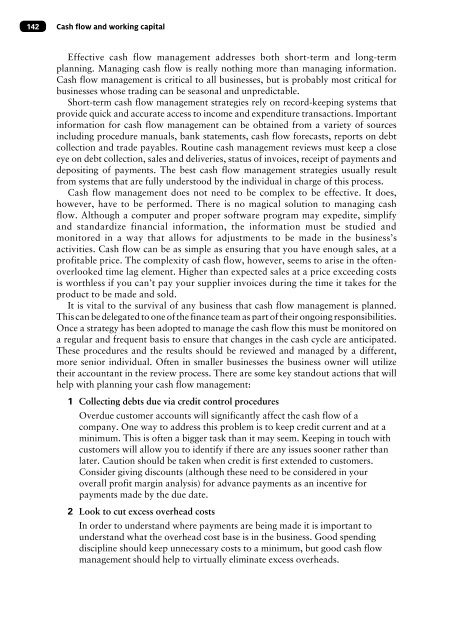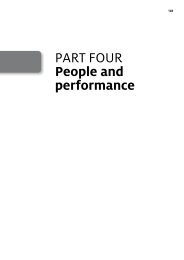The growing business handbook : inspiration and advice ... - Sparkler
The growing business handbook : inspiration and advice ... - Sparkler
The growing business handbook : inspiration and advice ... - Sparkler
Create successful ePaper yourself
Turn your PDF publications into a flip-book with our unique Google optimized e-Paper software.
142 Cash flow <strong>and</strong> working capital<br />
Effective cash flow management addresses both short-term <strong>and</strong> long-term<br />
planning. Managing cash flow is really nothing more than managing information.<br />
Cash flow management is critical to all <strong>business</strong>es, but is probably most critical for<br />
<strong>business</strong>es whose trading can be seasonal <strong>and</strong> unpredictable.<br />
Short-term cash flow management strategies rely on record-keeping systems that<br />
provide quick <strong>and</strong> accurate access to income <strong>and</strong> expenditure transactions. Important<br />
information for cash flow management can be obtained from a variety of sources<br />
including procedure manuals, bank statements, cash flow forecasts, reports on debt<br />
collection <strong>and</strong> trade payables. Routine cash management reviews must keep a close<br />
eye on debt collection, sales <strong>and</strong> deliveries, status of invoices, receipt of payments <strong>and</strong><br />
depositing of payments. <strong>The</strong> best cash flow management strategies usually result<br />
from systems that are fully understood by the individual in charge of this process.<br />
Cash flow management does not need to be complex to be effective. It does,<br />
however, have to be performed. <strong>The</strong>re is no magical solution to managing cash<br />
flow. Although a computer <strong>and</strong> proper software program may expedite, simplify<br />
<strong>and</strong> st<strong>and</strong>ardize financial information, the information must be studied <strong>and</strong><br />
monitored in a way that allows for adjustments to be made in the <strong>business</strong>’s<br />
activities. Cash flow can be as simple as ensuring that you have enough sales, at a<br />
profitable price. <strong>The</strong> complexity of cash flow, however, seems to arise in the oftenoverlooked<br />
time lag element. Higher than expected sales at a price exceeding costs<br />
is worthless if you can’t pay your supplier invoices during the time it takes for the<br />
product to be made <strong>and</strong> sold.<br />
It is vital to the survival of any <strong>business</strong> that cash flow management is planned.<br />
This can be delegated to one of the finance team as part of their ongoing responsibilities.<br />
Once a strategy has been adopted to manage the cash flow this must be monitored on<br />
a regular <strong>and</strong> frequent basis to ensure that changes in the cash cycle are anticipated.<br />
<strong>The</strong>se procedures <strong>and</strong> the results should be reviewed <strong>and</strong> managed by a different,<br />
more senior individual. Often in smaller <strong>business</strong>es the <strong>business</strong> owner will utilize<br />
their accountant in the review process. <strong>The</strong>re are some key st<strong>and</strong>out actions that will<br />
help with planning your cash flow management:<br />
1 Collecting debts due via credit control procedures<br />
Overdue customer accounts will significantly affect the cash flow of a<br />
company. One way to address this problem is to keep credit current <strong>and</strong> at a<br />
minimum. This is often a bigger task than it may seem. Keeping in touch with<br />
customers will allow you to identify if there are any issues sooner rather than<br />
later. Caution should be taken when credit is first extended to customers.<br />
Consider giving discounts (although these need to be considered in your<br />
overall profit margin analysis) for advance payments as an incentive for<br />
payments made by the due date.<br />
2 Look to cut excess overhead costs<br />
In order to underst<strong>and</strong> where payments are being made it is important to<br />
underst<strong>and</strong> what the overhead cost base is in the <strong>business</strong>. Good spending<br />
discipline should keep unnecessary costs to a minimum, but good cash flow<br />
management should help to virtually eliminate excess overheads.








